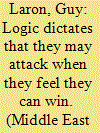| Srl | Item |
| 1 |
ID:
145291


|
|
|
|
|
| Summary/Abstract |
This article examines the Egyptian Muslim Brotherhood (MB) movement's stand on the South Sudan question. The aim here is to contribute to the ongoing debate over the MB's moderation. Throughout the civil war in Sudan, the MB consistently objected to South Sudanese secession. Yet, while it had traditionally framed its objection in religious terms, describing the South Sudanese struggle as a Christian conspiracy against Islam, in the decade preceding South Sudan's declaration of independence it moved to base its opposition on more practical grounds, revolving around issues such the absence of democracy, stability and infrastructure in South Sudan. This correlated with wider shifts in the MB. Since the 1990s, the movement has claimed to have undergone a transformation, adopting a moderate, pro-democratic stance. These statements persuaded many scholars that the MB has come to represent political moderation in both its domestic and international agenda. More recent works on the movement, however, have come to question the MB's moderation hypothesis, suggesting that even though the movement has changed its discourse and some aspects of its activism, this could not be seen as a linear process of moderation. This article uses the South Sudan case to further support this critique from a foreign policy perspective. It demonstrates that even though the MB changed its tactics and discourse, its goals remained unchanged— even when the circumstances and the normative environment changed dramatically. Moreover, it shows that at times of crisis, the liberal discourse gave way to the old-fashioned radical discourse of previous decades.
|
|
|
|
|
|
|
|
|
|
|
|
|
|
|
|
| 2 |
ID:
092631


|
|
|
|
|
| Publication |
2009.
|
| Summary/Abstract |
Scholars usually agree that the Israeli decision to attack Egypt in October 1956 was motivated by fear of an impending attack by the Egyptian army. That fear was spurred by the news of a large arms deal concluded between Egypt and Czechoslovakia in September 1955. However, Czechoslovak and Soviet reports, used here for the first time, reveal that the Egyptian army was encountering serious difficulties while trying to absorb these weapons. Newly declassified military intelligence assessments reveal that Israeli analysts maintained, even after the Czech-Egyptian arms deal, that the Egyptian army was no match to the IDF. The article goes on to explore the strategic consideration that stood behind the Israeli decision to go to war.
|
|
|
|
|
|
|
|
|
|
|
|
|
|
|
|